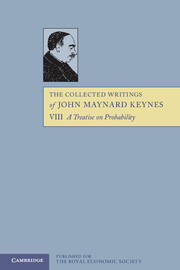Book contents
- Frontmatter
- Contents
- General Introduction
- Editorial Foreword by R. B. Braithwaite
- Editorial Note
- Preface to the First Edition
- I FUNDAMENTAL IDEAS
- II FUNDAMENTAL THEOREMS
- III INDUCTION AND ANALOGY
- IV SOME PHILOSOPHICAL APPLICATIONS OF PROBABILITY
- V THE FOUNDATIONS OF STATISTICAL INFERENCE
- Bibliography
- Index
Editorial Foreword by R. B. Braithwaite
Published online by Cambridge University Press: 05 November 2012
- Frontmatter
- Contents
- General Introduction
- Editorial Foreword by R. B. Braithwaite
- Editorial Note
- Preface to the First Edition
- I FUNDAMENTAL IDEAS
- II FUNDAMENTAL THEOREMS
- III INDUCTION AND ANALOGY
- IV SOME PHILOSOPHICAL APPLICATIONS OF PROBABILITY
- V THE FOUNDATIONS OF STATISTICAL INFERENCE
- Bibliography
- Index
Summary
This essay will attempt first to indicate the philosophical setting of 1921 in which Keynes's Treatise on Probability appeared, and then to estimate its importance in the development of the philosophy of probability during the following half-century. Since this philosophy is almost as controversial now as it was when Keynes wrote, my estimate will necessarily be a personal one.
The story of the writing of the Treatise has been fully told in R. F. Harrod's biography of Keynes. Keynes started work on probability in 1906 when he was in the India Office, and devoted most of his intellectual energy to it for the next five years until the book was nearly completed. After 1911 Keynes undertook commitments which delayed his completing the book; but wide publicity was given to some of his ideas in Bertrand Russell's The Problems of Philosophy (1912) in the Home University Library series. Although much of the Treatise was set up in type by August 1914, it was not published until August 1921 after Keynes had spent much of 1920 in his final revision.
As Keynes says (p. 473), his Treatise was the first systematic work in English on the logical foundations of probability for 55 years (and in fact there had only been one comparable work in another language between 1866 and 1915). Moreover the Treatise appeared at a time when philosophers in the empiricist tradition, then reviving in Britain and the U.S.A., were very interested in how (to use Russell's terms) ‘derivative knowledge’ could be based upon ‘intuitive knowledge’ by a logical relationship between them.
- Type
- Chapter
- Information
- The Collected Writings of John Maynard Keynes , pp. xv - xxiiPublisher: Royal Economic SocietyPrint publication year: 1978
- 2
- Cited by



